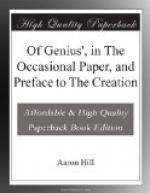After ‘Profusion of Bliss,’ that is to say, the heap’d Enjoyment of all Blessings to be wish’d for; how does it cool the Imagination, to read of being ‘pregnant with Delight’? Had she been brought to Bed of ‘Delight,’ it had been but a poor Delivery: For what imports ‘Delight,’ in Comparison with ‘Bliss’? And how much less too is pregnant with Delight,’ than ‘Delight’ in Possession! But then again, after both these, what cou’d the Author hope to teach us, by adding, that ’Pleasure reigns in her Presence.’ Can there be ‘Bliss’ without ‘Delight’? Was there ever ‘Delight’ without ‘Pleasure’? It shou’d gradually have ascended thus, Pleasure, Delight, Bliss; But to turn it the direct contrary Way, Bliss, Delight, Pleasure, is setting a poor Meaning upon its Head, and the same thing as to say, Mr. Addison writ incomparably, finely, nay, and tolerably. A Praise, which, I dare say, he wou’d have given no Body Thanks for. One wou’d think there were a kind of Fatality in Liberty, since scarce any Body can meddle either with the Word or the Thing, but they turn all topsey turvey.
But I am sliding insensibly into a Theme, that requires rather a Volume, than a Page or two; I hasten therefore to present you a Paraphrase on the Six Days Work of the Creator, as described to us by Moses, in the First Chapter of Genesis, which, you know, was written, originally, in Verse. It wou’d be difficult, I am sure, to match the Greatness of that inspired Author’s Images, out of all the noble Writings, which have honour’d Antiquity; and whose most remarkable Excellencies have been found, in those Parts of their Works, which they elevated, and made more solemn, by a Mixture of their Religion. Our Poetry, in so able a Hand as Yours, might receive heavenly Advantages, from a Practice of like Nature. But I am of Opinion, that no English Verse, except that, which we, I think a little improperly, call Pindaric, can allow the necessary Scope, to so masterless a Subject, as the Creation, of all others the most copious, and illustrious; and which ought to be touch’d with most Discretion, and Choice of Circumstances.
Mr. Milton, Mr. Cowley, Sir Richard Blackmore, and now, lately, a young Gentleman, of a very lively Genius, have severally tried their Strength in this celestial Bow; Sir Richard may be said indeed to have shot farthest, but too often beside the Mark; He will permit me the Liberty of owning my Opinion, that he is too minute, and particular, and rather labours to oppress us with every Image he cou’d raise, than to refresh and enliven us, with the noblest, and most differing. He is also too unmindful of the Dignity of his Subject, and diminishes it by mean, and contemptible Metaphors. Speaking of the Skies, he says they were
Spun thin, and wove, on Nature’s finest Loom.
Longinus is very angry with Timaeus for saying of Alexander, that he conquer’d all Asia, in less Time than Isocrates took to write his Panegyric, “Because, says the Critick, it is a pitiful Comparison of Alexander the Great with a Schoolmaster.” What then wou’d he have said of Sir Richard’s Metaphorical Comparison of the CREATOR Himself, to a Spinster, and a Weaver? The very Beasts of Mr. Milton, who kept Moses in his Eye, carry Infinitely more Majesty, than the Skies of Sir Richard.




